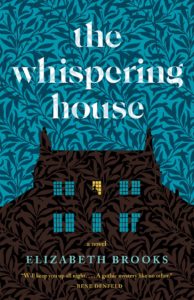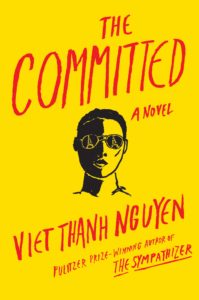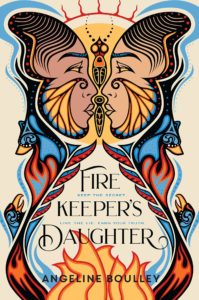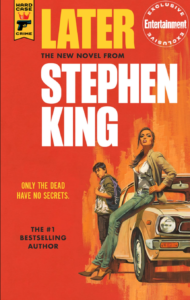A look at the month’s best reviewed crime novels, mysteries, and thrillers.

Elizabeth Brooks, The Whispering House
(Tin House)
“… atmospheric and creepy, and as needy, nostalgic Freya is pulled deeper and deeper into its shadows, the reader’s worry for her grows—and, with it, the novel’s suspense. Freya is haunted by words she wishes she could take back, the sister she lost, the love that never was, the hopes for the future that she couldn’t attain; all of these materialize in the deep shadows and shifting portrait-eyes of Byrne Hall. Brooks has crafted a slow-simmering, psychological, gothic novel about grief and longing.”
–Leah Von Essen (Booklist)

Viet Thanh Nguyen, The Committed
(Grove Press)
“Equal parts Ellison’s Invisible Man and Chang-rae Lee’s Henry Park, Nguyen’s nameless narrator is a singular literary creation, a complete original … The Committed indulges in espionage high jinks aplenty, but in truth the author is not as interested in them as a cursory plot summary might indicate. Nguyen is no le Carré and doesn’t wish to be. The novel draws its true enchantment—and its immense power—from the propulsive, wide-ranging intelligence of our narrator as he Virgils us through his latest descent into hell. That he happens to be as funny as he is smart is the best plus of all.”
–Junot Díaz (The New York Times)

Laurie Elizabeth Flynn, The Girls Are All So Nice Here
(Simon & Schuster)
“… kept me up all night – literally. I tore through the book in less than 24 hours, forcing my eyes to stay open as if the remaining pages wouldn’t be there in the morning … Finishing the novel, I lay in bed, unsettled by a plot that features women quite literally ripping each other apart over jealousy, pettiness and revenge. The girls are not so nice.”
–Morgan Hines (USA Today)

Alexandra Andrews, Who Is Maud Dixon?
(Little Brown)
“The soufflé Andrews has deftly constructed to this point deflates a bit when Florence moves to Helen’s house in the Catskills and starts the tedious business of doing this new work, mostly keeping her Machiavellian tendencies in check … Morocco seems almost beside the point; there is talk of souks and the buying of hats, but Andrews never firmly anchors us there … From there, Maud Dixon becomes less a Highsmith-esque character study—the tightly drawn portrait of a brilliantly charming sociopath—than a plot-heavy romp. There are feints, counterfeits, battles of wits, plot twists that appear from thin air. At a certain point, we realize—to our delight—that seeing things from Florence’s point of view has robbed us of the chance to consider that she is not the only one with a complicated agenda … assured.”
–Sarah Lyall (The New York Times)

Elly Griffiths, The PostScript Murders
(HMH)
“Griffiths’ strong sense of place—the sea is sparkling yet unsettling, Aberdeen’s cliffs beautiful yet unforgiving—provides a rich foundation for a cleverly constructed story with complex, memorable characters. Each is granted multiple turns to share their innermost thoughts, from feverish yet fearful interest in their detective work to poignant musings on years past. Through them, the societal tendency to underestimate the elderly is examined and defied time and again … a cozy bibliophile’s delight of a mystery that turns writerly research and acknowledgments into fodder for pivotal plot points, offers a tongue-in-cheek peek at the publishing business and pays tribute to friendships that transform into chosen families.”
–Linda M. Castellitto (Bookpage)

Donna Leon, Transient Desires
(Atlantic Monthly)
“The mystery is intriguing, but following the progress of Brunetti via canal and calle provides the real pleasure … The city, in Donna Leon’s novel, is as much a character as Guido and his family …Leon’s special skill is to splice glimpses of la dolce vita with acute analysis of moral and ethical dilemmas. Here one of the boys who dumped the girls has to decide whether or not to betray the friend with whom he is secretly in love … ‘They are so fragile, young people,’ Brunetti reflects, ‘their self-assurance such a thin layer.’ It is his humanity, and hard-won wisdom, that has made — and makes — him such a boon companion in crime. The series that has shadowed Brunetti for three decades is an epic achievement.”
–Mark Sanderson (The Times UK)

Angeline Boulley, The Firekeeper’s Daughter
(Henry Holt)
“A contemplative exploration of existing between two cultural identities meets fake relationship romance meets backwoods thriller in this absolute powerhouse of a debut from Ojibwe author Angeline Boulley … Firekeeper’s Daughter has a riveting plot that has all the hallmarks of a crime thriller while simultaneously questioning all the assumptions that the genre usually makes about policing and justice. I hit the middle and then couldn’t put it down. But Firekeeper’s Daughter is so, so much more than a thriller or a mystery … There has long been a need for more books that depict Indigenous people as living people in our modern world rather than as a romanticized and often inaccurate fairytale of the past, and Firekeeper’s Daughter carries that torch brightly.”
–Caitlyn Paxon (NPR)

Stephen King, Later
(Hard Case Crime)
“Does anybody write kids-with-strange-powers better than Stephen King? And, is there anyone on the scene who has more insider knowledge of the publishing industry? Later, King’s third Hard Case Crime installment, threads both of these into a single short novel that packs a punch … King’s writing in “Later” is as clean, direct and evocative as it’s ever been. The short, to-the-point chapters make for quick reading, the crime-driven plot is propulsive, involving guns, drugs, bombs and kidnapping, but, more importantly, some of the lines just take your breath away. Skin ‘pebbles’ with goose bumps. A dead person confronting Jamie is ‘like a burned log with fire still inside.’ But crawling into the head and voice and life of this kid narrator is where King especially excels.”
–Stephen Graham Jones (The Washington Post)

Peter Swanson, Every Vow You Break
(William Morrow)
“… dramatic things are happening left and right … Mr. Swanson…has a talent for gradually, disturbingly shifting his characters’ perception of what’s going on … Mr. Swanson’s shape-shifting saga is reminiscent, by turns, of such foreboding films as Vertigo, Fatal Attraction and The Wicker Man. Ultimately, Every Vow You Break reveals itself to be a violent melodrama, one which the author sees surehandedly through to a satisfying conclusion.”
–Tom Nolan (Wall Street Journal)

David Downing, Wedding Station
(Soho Crime)
“David Downing’s novels of crime, suspense, and espionage have danced through both world wars. His Station series, six titles before Wedding Station , evoke the relentless terror of life in Berlin during World War II. Now, in a fierce and daring prequel, Downing reveals the back story to the propulsive series … Wedding Station (the title refers to a location in Berlin, Wedding, pronounced with a V sound at the start) is an ideal choice for both Downing fans and newcomers to his fast-paced and intense crime novels. As a ‘prequel,’ it won’t require catch-up time, except perhaps for the alphabet soup of the various German groups menacing Berlin. And as part of the series, it’s a marvelous exploration of how John Russell steps out of ordinary life into endless dangerous choices, and into how the Nazi regime will convince itself of a mission to subdue all of Europe.”
–Beth Kanell (New York Journal of Books)


















